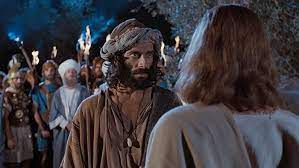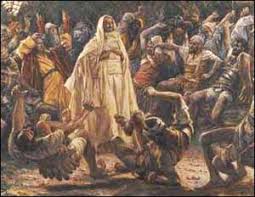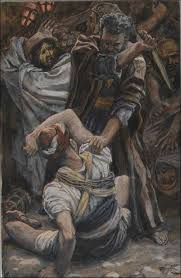Jesus Betrayed, Arrested and Deserted
Matthew 26:47-56; Mark 14:43-52;
Luke 22:47-53; John 18:2-12a
About 1:30 am Friday morning, the fifteenth of Nisan
Jesus betrayed, arrested and deserted DIG: What kind of Messiah was the large, armed contingent expecting to arrest? Was the fighting apostle’s essentially the same as the Roman soldiers? Why or why not? What is the irony in Judas’ betrayal? In Peter’s use of his large knife? How must the servant – first attacked and then healed – feel about what was happening? What does Jesus’ response to Judas, the mob, and the talmid show about the type of Messiah He is? How do you account for the reaction of the talmidim in Mark 14:47 and 50-51? What is the cup that Christ must drink? Who’s afraid of whom here? Why?
REFLECT: Knowing yourself, how do you think you would have reacted if you had been with Yeshua in this scene? When have you felt you had a better way to deal with things than the Lord? What issue of obedience is challenging you right now? How does your view of what a messiah should be correspond to the view of Christ in this passage? What impresses you the most about this passage?
Now Judas, who betrayed Jesus, knew the place, because the Great Rabbi had often met there with His talmidim (John 18:2). The three got to their feet quickly. James and John ran across the road to warn the others. Peter, as was fitting, remained at the side of his Master. These things had barely been done when the garden of Gethsemane became filled with light and sound and men moving among small trees and shrubs and flowers. The eight who had been sleeping in the cave and young Mark could have fled to the Bethany road, only a hundred yards to the north, but they were in a daze. And so, instead of running away, they walked over to the Garden, not so much to see what the raiders would do to Yeshua, but rather to see what Jesus would do to the raiders.

The scene was chaotic. Just as He was speaking, Judas, one of the Twelve, came to the grove leading a large crowd armed with swords, clubs, torches and lanterns (Matthew 26:47; Mark 14:43a; Luke 22:47a). In an interesting side note from the Talmud, it is written that the House of Annas (the high priest behind the scenes) was so corrupt because its members were known “to beat people with clubs” (Tractate Pesachim 57a).1498 With Judas was a cohort of 500 Roman soldiers, and some Temple guards provided by the high priest and the Pharisees who were members of the Great Sanhedrin (Mark 14:43b; John 18:3 CJB). There were 21 rules of the Great Sanhedrin regarding trials and in their zeal to kill Jesus they broke every one of them on the fifteenth of Nisan. They were desperate. And for such a cause they believed that the end would sanctify any means. Because members of the Sanhedrin were included in the cohort that arrested Yeshua they broke rule number 3 that said that members of the Great Sanhedrin were not allowed to participate in the arrest (to see link click Lh – The Laws of the Great Sanhedrin Regarding Trials).
The face and figure of Jesus were well lighted by the torches. Peter stood by, trembling. The remaining talmidim came up and it seemed to them, even though the Garden was full of men, no one was in a hurry to approach Messiah. Men were stumbling about, and calling to one another, and members of the Temple guard could be seen among them. But there was a reluctance to be first to step into the little clearing where the Living Word stood. Knowing all that was going to happen to Him, Jesus went out and looked specifically at the representatives of the Great Sanhedrin and asked them: Who is it you want? “Jesus of Nazareth,” they replied. I AM He: Jesus said. And Yochanan noted that Judas the traitor was standing with them, which indicated which side he was on (John 18:4-5).

When Yeshua said: I AM He, they drew back and fell to the ground (John 18:6). Then five hundred hardened Roman soldiers flew backwards and fell to the ground merely by His spoken word. The enemies of God fell back before the presence of the Almighty, foreshadowing their posture at the end of time (Isaiah 45:23; Romans 14:11; Phil 2:10-11; Revelation 3:9). Quite frankly, I don’t see how they mustered up enough courage to continue with the arrest! This was judgment, not a blessing. In the presence of God, believers always fall forward and bow down to worship Him.
Again He asked them: Who is it you want? The Temple guard now joined in and shouted the reply: Jesus of Nazareth! After their voices had died down, Jesus repeated His declaration of identity saying: I told you that I AM He. Their business was with Him, not them. Then He pointed behind Him to His apostles. If you are looking for Me, then let these men go. Jesus said I AM three times (see Exodus At – I AM Has Sent Me to You). As the Good Shepherd, Messiah laid down His life for His sheep. His protection of His talmidim was a perfect illustration of His substitutionary payment for sin. He died not only for them . . . but instead of them. As the Chief Shepherd, He did not lose any of His sheep. This happened so that the words He had spoken in John 6:39 would be fulfilled: I have not lost one of those you gave Me (John 18:7-9).
Now the raiders began to take courage. They stepped forward and, as they crowded around, not yet daring to touch the Nazarene, it was time for Judas, already possessed by the devil, to betray his Friend. The traitor had arranged a signal with them, “The one I kiss is the man; arrest Him and lead Him away under guard” (Matthew 26:48; Mark 14:44). Kissing a rabbi was the means by which a disciple committed himself to him for discipleship. It was a way of showing respect (Tractate Rosh Hashanah 2:7). Although the full moon of Passover would have made the sky brighter, they would still need exact identification of this person in the middle of the night.1499 There was no time to lose.

At last Judas walked into the little open space. His eyes opened with happy surprise and his mouth formed a smile. He opened his arms wide and hurried to the Master. Going at once to Jesus, the apostate apostle said, “Greetings Rabbi!” and unabashedly kissed Him (Matthew 26:49; Mark 14:45; Luke 22:47b). The verb kissed is kataphileo, not the simple verb. It has a prefixed preposition that lends intensity to the already existing meaning of the verb. Thus, it was a passionate, affectionate kiss the traitor gave Him. And Jesus asked him: Judas, are you betraying the Son of Man with a kiss (Luke 22:48)? It is a bitter irony that Judas’ final contact with Yeshua was a kiss. It was the kiss of death – not for Messiah, but for Judas. The one doomed to destruction (John 17:12) must still hear the words of Yeshua ringing in his ears, and will, for all eternity: Judas, are you betraying the Son of Man with a kiss . . . Friend, do what you came for.1500
At first glance, what seems to be a great tragedy is actually the fulfillment of the Father’s plan for eternal redemption (see my commentary on Exodus Bz – Redemption). However, Judas was not merely an unwilling pawn, but had the free will to choose what decisions he made. Thus, he is held accountable for his actions. When God’s sovereignty and our free will collide, it’s called antimony – two things that seem contradictory but both are true (like the Trinity). Sometimes situations like this are hard for us to comprehend. Therefore, we find comfort in the confession of our forefather Abraham when he said that the Judge of all the earth will do what is just (Genesis 18:25 CJB).

When the soldiers saw that Jesus was giving Himself up voluntarily without any show of resistance, then they stepped forward and seized Yeshua. When Christ’s followers saw what was going to happen, they said, “Lord, should we fight with our knives” (Luke 22:49)? But suddenly before the question had hardly been spoken, Simon Peter stepped in front of Jesus without a word and pulled out his large knife (Greek: machairan) and struck the high priest’s servant, cutting off his right ear (Matthew 26:50-51; Mark 14:46-47; Luke 22:50). Kefa wasn’t trying to kill the high priests’ servant. He did exactly what he intended to do, for according to the Oral Law (see Ei – The Oral Law), to lose an ear not only shamed the servant, but also disqualified him for service in the Temple. The basis for cutting off the ear was known by all those Jews present, having been derived from the Torah, which declares that no man with a physical defect can work among the Temple priests (see the commentary on Leviticus Dp – Priests with Defects). According to the Septuagint, a man with such a defect could not come near the purification offering (see Leviticus Al – The Purification Offering: Purified by the Blood).
Kefa was actually not doing anything particularly new. There were several other similar incidents in history. In 40 BC, for example, Antigonus, a Persian candidate for high priest, had the ear of his uncle, Hyrcanus II, cut off to shame him and disqualify him for the office. During the reign of Herod the Great, this happened more than once, and Josephus mentions it in his history of the first century. The Oral Law gives details of the practice, saying it was actually the earlobe that was cut off.
The high priest had sent his servant, whose name was Malchus. The family of Caiaphas and the family of the apostle John knew each other, that’s why John knew the name of this servant. But the Great Physician answered: No more of this! And He touched the man’s ear and healed him, no doubt saving Peter’s life. Luke alone notes this. But the healing went unnoticed in any public sense. Then Jesus commanded Simon Peter: Put your knife away. And even though the Greek word machairan means a large knife with a single edge, the common phrase: for all who live by the sword will die by the sword is more common than for all who draw the large knife will die by the large knife! His Kingdom would not come by the force of man because the knife is no substitute for faith. Shall I not drink the cup the Father has given Me (Mattityahu 26:52; Luke 22:51; John 18:10-11)? Nothing would come between Him and His destiny . . . the cross.
Then the Romans decided that this emotional scene had gone far enough. The detachment of soldiers with its tribune and the Jewish Temple guard arrested Yeshua (John 18:12a). The proper manner, taught by the academy of soldiery in Rome, was to take the victim by the right wrist, twist the arm behind him so that his knuckles touched between his shoulder blades and, at the same time, jam the heel down on his right instep. This was the beginning of the pain Jesus would feel this day.
Some of the Temple guards, not wanting to be shamed in the presence of Gentiles, grabbed the other arm and put it behind the Lord’s back and brought out rope and tied His hands. A long noose was placed about His neck. He was patient with His captors. Now that Jesus was bound, the Sadducees began to take courage and issue orders.
As if speaking to the other apostles, Christ noted how foolish it would be to try and defend His Kingdom with physical force. Jesus said: Do you think I cannot call on My Father, and He will at once put at My disposal more than twelve legions of heaven’s angels (Matthew 26:53)? Angels are available to help God’s people in time of need (Psalm 91:11), and are seen in military terms in the phrase in the TaNaKh: all the armies of heaven (First Kings 22:19 NLT). This is especially true with the angelic armies led by Michael in Dani’el 10:13, 20-21, 12:1 and Revelation 12:7. While legions here might be a figurative term for vast numbers (a full Roman legion was composed of 5,000 soldiers) the choice of such a military term in connection with defense against this armed mob is surely deliberate.1501 So, Peter’s demonstration of self-willed bravery, however well intentioned, was therefore unnecessary and absurd. The Lord’s battles are won in His power alone, and any human efforts on His behalf that are not made in submission to His divine will and strength are presumptuous and futile.1502
But how would the TaNaKh be fulfilled that say it must happen in this way (Matthew 26:54)? For Peter to violently oppose Yeshua’s arrest was also to oppose the fulfillment of God’s promised plan of redemption. He reminded Kefa that according to the TaNaKh . . . it must happen in this way. On several other occasions He had told the Twelve that it was necessary for Him to suffer and die, and be raised from the dead.
As David had predicted, a close and trusted friend would betray the Messiah (Psalms 41:9, 55:12-14). Isaiah foretold that He would be despised and rejected by men, a man of pains, well acquainted with illnesses . . . stricken and afflicted by God . . . pierced for our transgressions . . . crushed for our sins . . . the punishment that brought us peace was upon Him and by His wounds we are healed of our sins. He would be oppressed, afflicted and slaughtered like a lamb that does not cry out. Yet it was the LORD’s will to crush Him and cause Him to suffer and make His life an offering for sin. And after He has suffered, He will see the light of life (Isaiah 53:3b, 4b, 5 CJB).
At this point, Yeshua turned to the mob and challenged them with a convicting question. In that hour Jesus said to the crowd: Am I leading a rebellion, that you have come with swords and clubs to capture Me? He and His followers were not seeking a violent overthrow of the Romans, or anyone else for that matter. With a little scorn in His voice, He continued: Every day I was with you teaching in the Temple courts, and you did not lay a hand on Me. They said nothing. Some looked away. But then, Jesus said softly: All of this has taken place that the writings of the prophets might be fulfilled. The treachery of Judas and the secrecy of the arrest were both fulfillments of prophecy. This is your hour – when darkness reigns (Matthew 26:55-56a; Mark 14:48-49; Luke 22:52-53). Even the minute details of Messiah’s betrayal came true.
Then all the talmidim deserted Him and fled (Matthew 26:56b). Messiah had predicted this earlier that evening when He said: This very night you will all fall away on account of Me, for it is written in the TaNaKh itself: I will strike the Shepherd, and the sheep of the flock will be scattered (Mattityahu 26:31; Mark 14:27; Luke 22:31-32; Zechariah 13:7). They did turn away from Jesus. Peter even denied Christ three times, and sealed it with a curse. How did that differ from Judas’ betrayal?
For one thing, there was a difference in motivation. The apostles fled out of fear and in the pressure of the moment; Judas’ betrayal was a calculated act of treachery. The talmidim failed in the face of a great trial; Judas’ act of treason was something he pursued, the response of a greedy heart. The Eleven later turned from their sins and humbly accepted Christ’s forgiveness; Judas was resolute in unbelief and hatred. He even confirmed it with an act of suicide. The apostles’ denial was a lapse of normal faithful behavior; Judas’ sin manifested an utterly depraved soul.
The mark of a true disciple is not that we never sin, but that when we do sin we inevitably return to Jesus Christ to receive forgiveness and cleansing. Unlike the false disciple, the true disciple will never turn away completely. We may occasionally return to our fishing nets, but in the final analysis we are drawn again to the Master.
Judas epitomizes a false disciple. Note carefully the characteristics of his hypocrisy:
First, Judas loved temporal gain more than eternal riches. He wanted glory, success and earthly treasures. He had his heart set on a high position in Jesus’ earthly Kingdom. When that didn’t seem like it was going to happen, Judas thought that he’d help the process along by forcing the Master’s hand. After all, if He was really the Messiah, surely He’d drive the dreaded Romans out of Isra’el, wouldn’t He? It’s typical of false disciples that they get on board with Christ to get what they want, but when instead of delivering He makes demands on them, they turn away. These people reveal that they never had genuine faith to begin with (First John 2:19). They follow the Lord for a while, but eventually they sell out for selfish desire, money, prestige or power.
Second, Judas was deceitful. His show of faith was only a masquerade. False disciples are masters of subtle deception, adept at fooling others. They pretend to love Christ, but their kisses are the kisses of betrayal.
Third, Judas and all false disciples are in it for what they can get out of it. They are satisfied with a salved conscience, peace of mind, a good reputation, or spiritual self-satisfaction. Some of them profess Yeshua because it’s good for business, or because they think by trusting He will bring health, wealth or prosperity. But, like Esau who sold his birthright for a pot of stew, they will sell the Savior. Like Judas, false disciples love the world and the darkness. Their half-hearted faith inevitably turns to hard-hearted unbelief.1503
Yeshua was about to fulfill all the requirements associated with the mission of the suffering Messiah, Meshiach ben Joseph (see Mv – The Jewish Concept of Two Messiah’s). Now He was alone, deserted by His talmidim, and yet prepared to complete the final chapter of His earthly ministry for the salvation of Isra’el and the Gentile nations.1504
The tribune wanted to know whether the prisoner was to be taken to the Temple for trial, and conflicting shouts echoed through the grove. The ranking Sadducees and Pharisees consulted and said no, the prisoner was to be taken to the home of the high priest. They said it would be preferable not to return by going through the Temple compound. It was holy ground and Caiaphas didn’t want it desecrated by this blasphemer, and besides, with all the pilgrims after the Temple gates opened at midnight it would be too dangerous. A riot might ensue if they saw the Nazarene under Roman guard with His hands tied behind His back.
The Romans studied the prisoner. They could see nothing but a mild, inoffensive man. He stood quietly, and now His head was lowered, so that His beard touched His chest. Some of the Temple guard asked the troublemaking Rabbi questions – mostly about His alleged divinity – but His head remained bowed. The Gentiles, looking around, were certain that some of the friends of the prisoner were more sinister than this subdued weakling.
Someone prodded Jesus, and the march began. The mob was in front of Him and flanking Him and behind Him. The priests were pleased that the whole matter had been done with such quiet dispatch. Yeshua had muttered no spell, had conjured up no fire or brimstone to destroy them all. This, of course, proved that he was no more a Messiah than they. If he were the Messiah, then he had the power to destroy them. If he did not use the power then he did not have it, and if he did not have it then he was just another imposter under arrest.
Time had caught up with him, they thought. If he had only remained in Galilee with his pronouncements of love, he could have become rich. But no, he pressed his luck. He had to storm Jerusalem, and Jerusalem was known to kill real prophets. What chance did the Nazarene magician have there?
Some of the guards at the rear of the line of march noticed that his small band of followers was not too far behind. The guards winked at each other and turned as if to pursue them. All took flight quickly, and disappeared into the darkness so fast that the Romans laughed and made jokes about their speed. A young man, (in this case Mark) wearing nothing but a linen garment (because he was suddenly awakened when the raiders invaded his father’s house looking for the Lord), was following Jesus. When the soldiers seized Him, he fled naked, leaving his garment behind (Matthew 26:56b; Mark 14:50-52). Therefore Mark was an eyewitness to the arrest. It’s like the monogram of the artist in the dark corner of a picture. It was the way of literature in the ancient world.
The march took them from Gethsemane to the Bethany Road. There, they turned and marched up the big hill to the north of the City, down through the Tyropoeon Valley, then south through the Second Quarter to the Upper City, passing between Herod’s Palace and Pilot’s Palace, continuing south to the Essene Quarter. They took the long way around the Temple to avoid any detection. Jesus, His head still down, not answering any of the taunts, walked barefoot with His hands tied behind His back and the noose jerking slightly at His neck.1505 They took Him to the house of the high priest, Joseph Caiaphas.



Leave A Comment